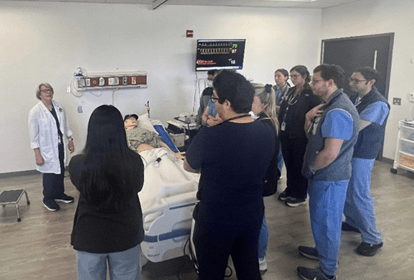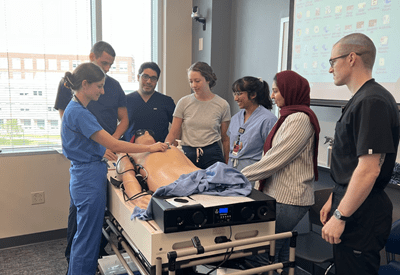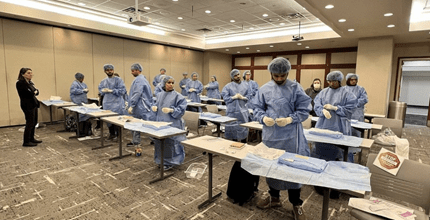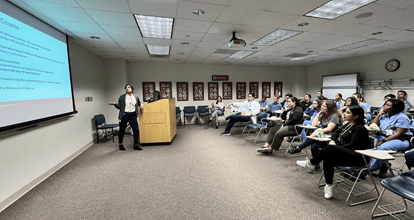The Internal Medicine Residency program at Indiana University School of Medicine offers a variety of educational conferences for our residents.


- Noon Conferences: Each of our hospitals offers a plethora of conferences led by our chief residents and faculty. These conferences typically take place on Mondays, Tuesdays, and Thursdays at noon.
- Resident Report: Junior and Senior residents on general or subspecialty ward services present an interesting case under the guidance of a chief resident and expert faculty to their peers. These reports typically go over medical reasoning, differential diagnoses, workup and management to help our housestaff develop the skills needed to dissect such cases when encountered in their daily clinical work.
- Ambulatory Academic Half-days: These sessions cover topics relevant to ambulatory practice, including interactive lectures about skin findings and eye findings, the use of exercise as medicine, and an in-depth dive into nutrition and the health effects of contemporary fad diets. Every session is covered by protected didactic time.
- IMPACT Lecture Series: Every Wednesday, residents and interns separately receive updates on high-yield medical topics from various key clinic educators that are tailored to their level of training. The lectures are covered by protected didactic time.
- Ambulatory High-Yield Topic Discussion: These lectures were created for the ambulatory rotation during the COVID-19 pandemic to provide educational opportunities when outpatient clinics were unexpectedly cancelled. On a high-yield discussion day, residents listen to a podcast, complete a module, and read one research publication about a high-yield topic, such as diabetes. They then discuss what they learned with the ambulatory chief resident at the end of the day.
- Intern Core Lecture Series: For the first two months of their training, our interns are offered on a weekly basis a crash course on common medical complaints, inpatient emergencies, high-yield MICU topics as well as ultrasound basics and simulation to help kick start their careers in Internal Medicine.
- Department of Medicine Grand Rounds: Invited speakers share with residents and faculty their updates and expertise about various medical topics.
- Journal Club & EBM Lecture Series: Each month, our residents and interns dissect a clinic question encountered during their clinic work with one of our librarian and chief residents in small groups. They then select two articles to discuss during a monthly journal club.
- Quality Improvement/Patient Safety Conferences: This conference is led by our senior residents and discusses a case encountered during their safety rotation with potential maneuvers and projects directed at improving practices.
- Senior Seminars: Each of our third-year residents gets to pick a topic of their choice to dissect and review along with the assistance of a mentor considered to be an expert in the field. They are then invited to present this extensive review to our residents and faculty as part of our Senior Seminar Series every Monday for the second half of the academic year.
- Simulation Training: Our interns and residents get to experience simulation scenarios related to Code Blues, airway management, ultrasound and procedural training in our state of the art simulation center at Fairbanks Hall.
- POCUS Curriculum: Throughout the year, interns and residents will complete modules to learn the basic techniques in cardiac, lung, abdominal, and soft tissue ultrasound. Hands-on experience operating and interpreting POCUS images occurs in our simulation lab every 2-3 months. Each of our teaching teams has access to an ultrasound probe which can be used on daily rounds.

